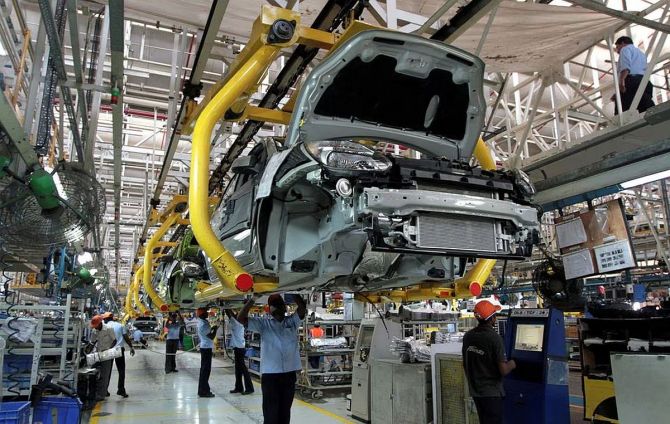The automobile sector, which represents big-ticket consumption, continues to do well and has increased its share in corporate revenues and profits while fast-moving consumer goods (FMCG) companies that sell low-ticket consumer goods are struggling with poor sales and earnings growth.

The share of the automobile sector, including makers of auto ancillaries, in corporate net sales rose to a 10-quarter high of 10.05 per cent during July-September 2023 (Q2FY24) from 8.94 per cent a year earlier and 9.75 per cent in Q1FY24.
In comparison, the share of FMCG companies such as Hindustan Unilever, ITC, Asian Paints, and Nestle in corporate net sales declined to 2.76 per cent in Q2FY24 from 2.79 per cent a year ago and 2.85 per cent in Q1FY24.
The automotive companies’ combined net sales were up 19.1 per cent year-on-year to Rs 3.35 trillion in Q2FY24, while those of 3,123 listed companies (gross interest income in the case of banks and finance) in the Business Standard sample were up 6 per cent to Rs 33.5 trillion in the same period.
The FMCG companies, on the other hand, underperformed with 4.7 per cent Y-o-Y growth in net sales in Q2FY24 at Rs 91,910 crore.
This was the slowest growth reported by them in the post-pandemic period.
The automotive sector has seen a steady rise in its contribution to corporate profits while FMCG companies lost some of their heft in corporate earnings.
The automotive sector’s share in overall corporate profits jumped to an 11-quarter high of 7.3 per cent in Q2FY24 from 5.1 per cent in Q2FY23 and 6.2 per cent in Q1FY24.
In contrast, FMCG companies accounted for only 4.8 per cent of overall corporate profits in Q2FY24, down from the 5.9 per cent in Q2FY23 and 5 per cent in Q1FY24.
The automotive companies’ combined net profits nearly doubled in Q2FY24 to Rs 22,453 crore from Rs 11,453 crore crore in Q2FY23.
The sector also performed well on a sequential basis with a 12.9 per cent rise in net profits from Rs 19,881 crore in Q1FY24.
In contrast, FMCG companies’ combined net profits were up 13 per cent Y-o-Y to Rs 14,818 crore in Q2FY24 from Rs 13,115 crore a year ago, but their earnings were down 7.5 per cent sequentially from Rs 16,019 crore in Q1FY24.
The combined net profits of all listed companies were up 38 per cent Y-o-Y to Rs 3.07 trillion in Q2FY24 from Rs 2.22 trillion a year ago.
Both automotive and FMCG companies gained from a margin expansion in Q2FY24 but overall gains for the auto sector were bigger due to better volume growth while gains for FMCG companies were capped due to poor volume growth in the second quarter.
A better than expected showing by the automotive sector was driven by four-wheeler makers such as Tata Motors, Maruti Suzuki, and Mahindra and Mahindra while two-wheeler makers like Bajaj Auto, Hero MotoCorp, and TVS Motor Company underperformed their four-wheel peers and reported muted growth in net sales and profits.
The financial performance of two-wheeler companies was closer to that of FMCG companies.
Analysts attribute the contrasting performance of automotive and FMCG companies to budget constraints faced by the majority of the households at the lower end of income pyramid while top earners are doing relatively well.
“A relatively poor showing by the whole gamut of consumer companies, ranging from FMCG, apparel, undergarments, organised retail to consumer electricals, in Q2FY24 hints at budget constraints for the majority of the households, which comprise the fat lower arm of the K-shaped economic growth in the country.
"In contrast, the upper arm represented by relatively rich households are doing better and fuelling demand in the auto sector and luxury consumption,” said Dhananjay Sinha, co-head of equities and head of research of strategy and economics, Systematix Group.
According to him, growth in the automotive sector is also being supported by a boom in retail credit and household leverage.
According to the data from the Reserve Bank of India, vehicle loans by banks were up 21.12 per cent Y-o-Y in the first six months of FY24 against 20 per cent growth in overall non-food bank credit during the period.
Personal loans were up 30.4 per cent Y-o-Y during the period.
Others attribute the poor performance by FMCG companies to poor consumer demand in rural India.
“The companies within our coverage universe delivered muted cumulative sales growth in Q2FY24.
"Volume growth has remained at the same level as seen in Q1, still remaining at lower levels due to the persistent softness in rural India,” wrote analysts at Motilal Oswal Financial Services in an earnings review for the second quarter.












 © 2025
© 2025